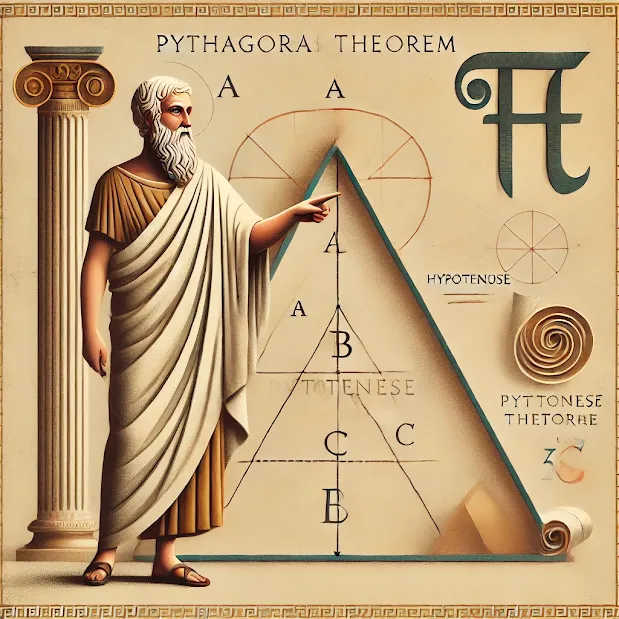Pythagoras: A Visionary Thinker Beyond Mathematics
Pythagoras: A Visionary Thinker Beyond Mathematics
Pythagoras, one of the most influential thinkers of the ancient world, left a profound impact not only on mathematics but also on philosophy, music, cosmology, and ethics. Living between 570 BCE and 495 BCE, this legendary figure inspired countless philosophers and scientists with his beliefs in the mystical power of numbers and the order of the universe. Today, by closely examining Pythagoras’s life, ideas, and legacy, we seek to understand the depth of his genius.
1. The Life and Origins of Pythagoras
Although exact details about Pythagoras’s birth are limited, it is widely believed that he was born on the Greek island of Samos and later lived in Croton, a city in southern Italy. This region was a hub of cultural and intellectual exchanges between the East and the West. These influences shaped Pythagoras’s intellectual framework and his approach to understanding the universe. From a young age, he developed a deep interest in mathematics, philosophy, and music, not only acquiring theoretical knowledge but also seeking to grasp the intricacies of practical life.
2. Mathematical Genius: The Magic of Numbers
Pythagoras viewed mathematics not merely as a tool for calculation but as a fundamental language of the universe. To him, numbers were the building blocks of reality, each possessing its own unique meaning and energy. This perspective infused mathematics with a mystical dimension.
The Pythagorean Theorem
One of his most famous contributions, the Pythagorean Theorem, describes the relationship between the sides of a right triangle. However, beyond its geometric significance, this theorem was also seen as a reflection of universal harmony.
The Symbolic Meaning of Numbers
Pythagoras and his followers believed that numbers reflected the cosmic order. For example, the number 10 was considered to represent perfect completeness. This belief influenced both mathematical thought and mystical rituals.
3. Philosophical and Cosmic Perspectives
Beyond mathematics, Pythagoras was a philosopher striving to comprehend the universe. His philosophy centered on the spiritual development of humans and their deep connection with the cosmos.
Cosmic Order and Harmony
Pythagoras believed that the universe had a structured order that could be expressed through mathematical ratios. He saw the harmony and rhythm in music as a reflection of the cosmic order. The Pythagoreans believed that music nourished the soul and that humans should live in harmony with the universe.
The Journey of the Soul
The immortality of the soul was a key element of Pythagoras’s teachings. He believed that the soul continued to exist even after leaving the body and underwent various cycles of rebirth. This idea reveals the mystical dimension of his philosophy.
4. The Pythagorean School and Its Social Influence
The school Pythagoras established was not just a center for education but also a community that upheld social and moral values. The Pythagoreans were individuals bound by principles of discipline, ethics, and communal living.
Education and Discipline
Students at the Pythagorean School were educated not only in mathematical knowledge but also in ethical values and social order. This education helped them develop both scientifically and morally.
Social Structure and Rituals
Members of the school followed specific rituals and shared a common lifestyle, which strengthened their spiritual and social bonds. This communal structure offers insight into how Pythagoras’s philosophy was put into practice.

5. The Legacy and Influence of Pythagoras
The ideas of Pythagoras have had a lasting impact from antiquity to the present day. His interpretations of numbers played a pivotal role in the evolution of mathematics and philosophy.
Mathematics and Science
The Pythagorean Theorem and the mystical meanings attributed to numbers have inspired later mathematicians and scientists. The foundations of modern mathematics still bear traces of ancient Pythagorean thought.
Philosophy and Mystical Teachings
Pythagoras’s spiritual and cosmic perspectives deeply influenced Plato and other ancient philosophers, shaping the development of Western philosophy.
Art and Music
His ideas on music and harmony contributed to new perspectives in the history of art. The mathematical ratios in music remain a lasting example of his approach to understanding the universe.
6. Conclusion: Pythagoras’s Universal Message
Pythagoras stands out not only for his mathematical genius but also for his profound understanding of the universe and the human soul. His life and teachings reveal the connection between humans and the cosmos, the captivating world of mathematics, and the significance of spiritual growth.
As technological and scientific advancements continue in the modern world, Pythagoras’s universal message—order, harmony, and spiritual depth—remains an enduring source of inspiration.
The unique balance between numbers and philosophy in Pythagoras’s teachings serves as a legacy that nourishes both the mind and the soul. Even in today’s complex world, his ideas remind us of the universal order and how humans can align themselves with it.








.png)

Comments
Post a Comment